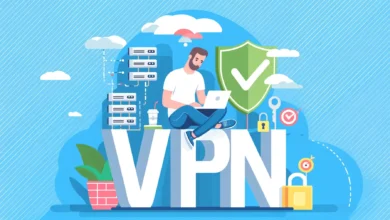A Deep Dive into Virtual Private Networks (VPNs)
Introduction
In an increasingly connected world, where privacy and security are of paramount importance, virtual private networks (VPNs) have emerged as an essential tool for safeguarding our online presence. Whether you are browsing the internet, accessing sensitive information, or even traveling abroad, a VPN can provide you with a secure and private connection. In this blog post, we will explore the ins and outs of VPNs, their benefits, and how they work to protect your digital footprint.
What is a VPN?
A Virtual Private Network, or VPN, is a service that allows you to create a secure connection to another network over the internet. It acts as a tunnel between your device and the websites you visit, encrypting your data and making it virtually impossible for anyone to intercept or decipher. By doing so, a VPN shields your online activities from prying eyes, whether they be government agencies, cybercriminals, or even your Internet Service Provider (ISP).
How Does it Work?
When you connect to a VPN server, your internet traffic is redirected through an encrypted tunnel. This tunnel encrypts your data and assigns you a new IP address, masking your true location. As a result, your Internet Service Provider (ISP) and other third parties only see the encrypted traffic, making it nearly impossible to trace your online activities back to you. This added layer of anonymity provides a sense of security and peace of mind in an increasingly surveillance-oriented landscape.
Imagine the internet as a vast ocean, filled with both treasures and treacherous currents. While it offers endless opportunities for connection and exploration, it also holds hidden dangers lurking in the depths. This is where a Virtual Private Network (VPN) emerges as your trusty submarine, navigating you through the murky waters and keeping you safe from lurking threats.
So, what exactly is a VPN? Simply put, it’s software that creates a secure tunnel between your device and the internet. It works its magic by:
- Encrypting your data: Your online activities, be it browsing, streaming, or chatting, are transformed into an unreadable jumble before venturing into the digital ocean. Even if pirates (hackers) intercept your data, they’ll be staring at gibberish without the secret key to decipher it.
- Masking your IP address: Think of your IP address as your digital fingerprint, revealing your location and potentially other information. A VPN cloaks your true IP, making it appear as if you’re browsing from a different location, a perfect trick to outsmart those tracking your online movements.
These core functionalities of a VPN unlock a range of benefits, making it a valuable tool for both individuals and organizations:
Enhanced Privacy and Security:
- Shield against hackers: Encryption renders your data unreadable, thwarting attempts to steal your information or hijack your connection.
- Defeat public Wi-Fi woes: Public Wi-Fi networks are notorious for being insecure. A VPN protects your data when connecting to open networks, keeping you safe from lurking hackers.
- Bypass surveillance and censorship: Many countries restrict access to certain websites and online content. A VPN lets you connect to servers in different locations, granting you access to previously blocked content and platforms.
Location Independence and Flexibility:
Work from anywhere: Connect to your company network securely from remote locations, ensuring data privacy and access to essential resources.
Enjoy global entertainment: Bypass geo-restrictions to access streaming services and websites unavailable in your region.
Shop internationally: Access better deals and avoid geo-price discrimination by masking your location.
Additional Advantages:
Improved online gaming experience: Reduce lag and ping in online games by connecting to servers closer to the game server.
Enhanced security for businesses: Protect sensitive company data and ensure secure employee access to resources from remote locations.
Compliance with data privacy regulations: A VPN can help businesses comply with regulations like GDPR and CCPA by anonymizing user data and protecting it from unauthorized access.
However, choosing the right VPN and navigating its world can be intimidating. Here are some key considerations:
Security features: Opt for a VPN with strong encryption protocols, a no-logs policy, and additional security features like malware blocking and kill switches.
Speed and performance: Look for a VPN with a large network of servers in various locations to ensure optimal connection speeds.
Price and value: Compare pricing plans and features to find a VPN that suits your budget and needs.
User-friendliness: Choose a VPN with a user-friendly interface and easy setup process, especially if you’re a beginner.
Remember, a VPN is not a foolproof solution, but it is a powerful tool to enhance your online privacy, security, and freedom. By understanding its functionalities, potential benefits, and key considerations, you can harness the power of this digital submarine and confidently navigate the vast ocean of the internet.
Hacks that can be prevented by VPN
Surf Securely: Hacks Thwarted by a VPN
The internet: a vast ocean of information, opportunity, and… danger. Lurking beneath the surface, hackers like digital pirates wait for unsuspecting web surfers, eager to plunder your valuable data or wreak havoc on your online life. But fear not, brave sailor! Armed with a trusty VPN (Virtual Private Network), you can hoist the sails of protection against a multitude of cyber threats. Let’s dive into the hacks a VPN can help you conquer:
1. Man-in-the-Middle Mayhem
Imagine a sneaky pirate intercepting your messages and stealing your logins. That’s what a man-in-the-middle attack looks like. But with a VPN, your data sails through an encrypted tunnel, invisible to prying eyes. Hackers are left waving at thin air while you reach your destination safely.
2. Wi-Fi Woes
Public Wi-Fi networks are havens for cyber pirates. Open ports are like unlocked treasure chests, inviting anyone to grab your data. But a VPN acts as a fortified port, encrypting your traffic and keeping your information safe, even in the stormiest Wi-Fi seas.
3. Location Looting
Hackers can use your IP address to track your location and target you with personalized attacks. But a VPN lets you change your IP address like a master of disguise, throwing off pursuers and keeping your digital whereabouts a secret.
4. Data Dredging
Imagine your browsing history and online activity laid bare for all to see. That’s the threat of data dredging. But a VPN shrouds your online movements in anonymity, making it practically impossible for anyone to track your digital footprints.
5. Identity Impersonation
Hackers can steal your personal information and impersonate you online, causing immense damage. But a VPN shields your data, making it harder to steal and harder still to impersonate you. You stay the captain of your own online identity.
Beyond the Hacks:
A VPN’s benefits go beyond just hack prevention. It can:
- Bypass geo-restrictions: Access blocked content and unlock global entertainment libraries.
- Boost your connection speed: Some VPNs can even optimize your internet speed for smoother streaming and browsing.
- Enhance your privacy: Keep your online activities confidential, even from your internet service provider.
So, weigh anchor and set sail for a safer, more secure online journey with a VPN. Remember, in the digital ocean, a little extra protection goes a long way!
Uses of VPN in Cybersecurity
In the ever-evolving landscape of cybersecurity, a Virtual Private Network (VPN) has become a valuable tool for both individuals and organizations to navigate the murky waters of the internet. Its ability to encrypt data and mask your online identity offers a formidable shield against various cyber threats and unlocks a range of security benefits. Here are some key uses of VPNs in cybersecurity:
1. Enhanced Privacy and Security
Encryption: A VPN creates a secure tunnel for your data, encrypting it before it leaves your device and decrypting it when it reaches its destination. This renders your information unreadable to hackers, even if they intercept it.
IP Masking: Your IP address acts as your online fingerprint, revealing your location and potentially other information. A VPN masks your true IP address, making it appear as if you’re browsing from a different location, adding a layer of anonymity to your online activities.
Data Protection: With a VPN, your browsing history, online transactions, and personal information are shielded from prying eyes, including your internet service provider (ISP) and potential government surveillance.
2. Defense Against Cyberattacks:
Man-in-the-Middle (MitM) Attacks: These attacks occur when hackers intercept your communication to steal data or manipulate websites. A VPN’s encryption renders data unreadable for the attacker, foiling such attempts.
Public Wi-Fi Safety: Public Wi-Fi networks are notorious for being unsecured. Using a VPN on such networks encrypts your traffic, protecting you from hackers lurking on the same network.
Malware and Phishing Mitigation: Some VPNs offer additional security features like malware blocking and phishing website detection, adding an extra layer of protection against malicious software and websites.
3. Location Independence and Access:
Geo-blocking Bypass: Many websites and online services restrict access based on your location. A VPN lets you connect to a server in a different location, granting you access to previously blocked content and platforms.
Improved Streaming Experience: By connecting to a server in a specific location, you can potentially improve your streaming experience by bypassing certain bandwidth throttling practices employed by some ISPs.
Business Expansion: Organizations can leverage VPNs to securely connect employees working remotely in different locations, ensuring secure data transfer and access to company resources.
4. Regulatory Compliance:
Data privacy regulations like GDPR and CCPA: A VPN can help businesses comply with data privacy regulations by anonymizing user data and protecting it from unauthorized access.
Data Security Requirements: In industries like healthcare and finance, where data security is paramount, a VPN can be a crucial tool for meeting compliance requirements and protecting sensitive information.
Remember, a VPN is not a silver bullet in cybersecurity. It’s important to practice safe online habits and choose a reputable VPN provider with strong security features to truly secure your online experience.
Best VPN service providers
Choosing the best VPN service provider can be overwhelming with so many options available. Here’s a quick rundown of some top contenders, each with its unique strengths:
1. NordVPN
- Top-tier security: Military-grade encryption, double VPN servers, and strict no-logs policy for ultimate privacy.
- Blazing-fast speeds: Enjoy seamless streaming and browsing with a global network of optimized servers.
- Global reach: Access blocked content and bypass geo-restrictions with servers in over 60 countries.
- Additional features: Threat protection, malware blocking, and split tunneling for added security and flexibility.
2. ExpressVPN
- Unmatched user experience: Intuitive interface and easy setup, perfect for beginners.
- Exceptional reliability: Consistently fast speeds and stable connections worldwide.
- Strong privacy focus: AES-256 encryption, no-logs policy, and a built-in kill switch for secure connections.
- Dedicated streaming servers: Enjoy buffer-free streaming of your favorite platforms.
3. Surfshark
- Unbeatable value: Affordable pricing plans with unlimited simultaneous connections.
- Powerful security: AES-256 encryption, multi-hop connections, and CleanWeb feature for ad and malware blocking.
- User-friendly: Simple interface and helpful customer support.
- No-logs policy: Browse and stream with complete privacy.
4. CyberGhost
- Beginner-friendly: Easy-to-use interface and pre-configured profiles for specific needs.
- Large server network: Over 8,000 servers in 90+ countries for optimal connection options.
- Strong encryption: AES-256 encryption and no-logs policy for secure browsing.
- Additional features: WireGuard protocol for increased speeds, dedicated streaming servers, and split tunneling.
5. ProtonVPN
- Swiss-based privacy: Stringent privacy laws and independent security audits for ultimate peace of mind.
- Secure Core technology: Multi-hop connections through secure servers for enhanced anonymity.
- Free tier available: Try ProtonVPN before committing to a limited free plan.
- Open-source code: Transparent and secure with publicly available code for verification.
Remember, the best VPN for you depends on your individual needs and priorities. Consider factors like security features, speed, price, server locations, and additional features when making your decision.
I hope this list helps you narrow down your choices and find the perfect VPN service provider to secure your online experience!






**mitolyn official**
Mitolyn is a carefully developed, plant-based formula created to help support metabolic efficiency and encourage healthy, lasting weight management.